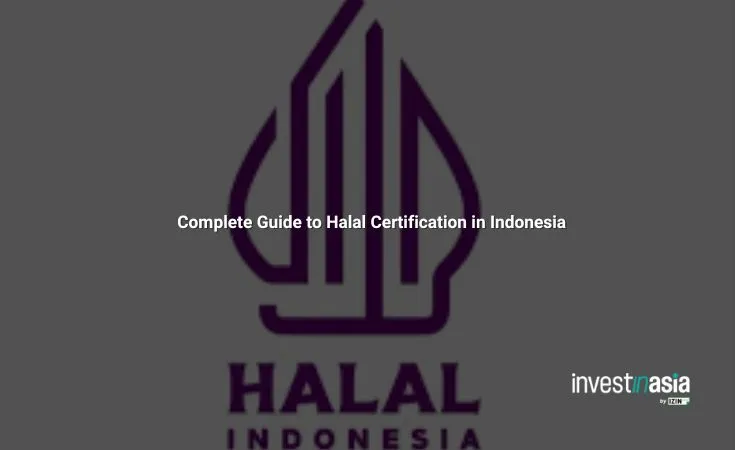Halal certification in Indonesia is no longer optional, it’s a legal requirement for nearly all products circulating in the Indonesian market. Under Law No. 33/2014 (amended by Law No. 6/2023) and Government Regulation No. 42/2024, businesses, both local and foreign, must ensure that their goods comply with the Halal Product Assurance (JPH) system managed by BPJPH, with certification validated by MUI and LPH.
For foreign investors and exporters, understanding and navigating this process is crucial to maintaining compliance and accessing Indonesia’s USD 3.2 trillion global halal market.
Understanding Indonesia’s Halal Certification Framework


Indonesia’s halal certification is structured to guarantee that all products meet Islamic law standards while ensuring legal certainty for consumers. The system involves three main authorities:
- BPJPH (Halal Product Assurance Agency): The main regulatory body issuing halal certificates.
- LPH (Halal Inspection Agencies): Independent auditors conducting product testing and facility inspections.
- MUI (Indonesian Ulema Council): Determines the religious halal status through its fatwa council.
These three entities work in synergy: BPJPH handles administrative control, LPH conducts inspections, and MUI provides religious validation.
Products Requiring Halal Certification
The regulation mandates halal certification for:
- Food and beverages
- Raw materials, additives, and auxiliary ingredients
- Medicines, supplements, and cosmetics
- Consumer goods and services
Products such as pork, alcohol, and those containing blood are exempt but must be labeled “non-halal” for transparency.
For micro and small enterprises (MSMEs), deadlines extend until October 2026, while larger businesses were required to comply by October 2024.
Also read: The Complete Guide to Indonesia’s Halal Industry for Foreign Investors
Certification Pathways
There are two halal certification registration schemes, namely:
Regular Scheme (for medium to large enterprises)
This pathway involves inspection and testing by accredited LPH institutions such as Sucofindo or LPPOM MUI.
Steps include:
- Online application via SIHALAL system.
- Verification by BPJPH.
- Audit and testing by LPH.
- Fatwa assembly decision by MUI.
- Certificate issuance by BPJPH.
Self-Declare Scheme (for MSMEs)
Simplified for small businesses producing low-risk goods. It includes:
- Online registration and documentation submission.
- Assistance from Halal Product Process (PPH) facilitators.
- Validation and fatwa decision.
- Digital certificate issuance by BPJPH.
Halal Assurance System (SJPH / HAS 23000)
All certified companies must maintain a Halal Assurance System (SJPH), adapted from the HAS 23000 standard.
It covers 11 core elements, including:
- Management commitment and halal policy
- Verified halal materials
- Documented production processes
- Internal audits and traceability
- Continuous system review
This system ensures ongoing compliance throughout a product’s lifecycle.
Certification Fees and Validity
Certification costs vary by business scale:
- MSMEs (Self-Declare) – Free (government subsidized)
- Medium enterprises – IDR 5–12 million
- Large/foreign businesses – IDR 12.5–25 million
Since GR 42/2024, halal certificates now have permanent validity, provided there are no changes in materials, processes, or suppliers. Businesses only need to update, not renew, their certificates when modifications occur.
Online System (SIHALAL) and Foreign Product Registration
All applications must be made through ptsp.halal.go.id.
Foreign products already certified by recognized foreign bodies may register under SHLN (Foreign Halal Certificate Registration), provided they originate from countries with Mutual Recognition Agreements (MRA).
This system streamlines registration for imported goods, reducing time and administrative complexity for global brands entering Indonesia.
Compliance, Enforcement, and Business Benefits
Under the latest regulation, certified businesses must:
- Appoint a halal supervisor.
- Maintain accurate product information.
- Separate halal and non-halal facilities.
- Ensure correct halal labeling.
Non-compliance may result in fines, market access restrictions, or product recalls.
However, achieving certification brings powerful advantages:
- Access to Indonesia’s 275 million consumers.
- Easier export licensing.
- Enhanced brand trust among Muslim consumers.
- Eligibility for government incentives.
Also read: What Happens If You Operate a Business in Indonesia Without a Proper License?
Practical Guidance for Businesses
Here are some tips from InvestinAsia for businesses that want to apply for halal certification:
For MSMEs
- Use the Self-Declare scheme to save cost.
- Assign an Indonesian halal supervisor.
- Maintain simple documentation and utilize government assistance programs.
For Medium to Large Enterprises
- Implement a comprehensive SJPH early.
- Engage accredited LPH with relevant industry expertise.
- Plan compliance for multiple product lines simultaneously.
Partnering for Compliance and Market Entry
Navigating Indonesia’s halal certification framework can be complex—especially for foreign investors.
At InvestinAsia, we help businesses obtain all required licenses and permits, including halal certification. Our team ensures smooth compliance so you can focus on scaling your operations in Indonesia’s thriving market.
Explore further at InvestinAsia’s Indonesia Licenses and Permits Application Services.
Contact us today for a FREE consultation and start your expansion journey.
FAQs
Who issues halal certificates in Indonesia?
BPJPH is the sole authority issuing halal certificates, following inspection by LPH and religious validation by MUI.
Is halal certification mandatory for imported goods?
Yes. All products sold in Indonesia must comply, though foreign certificates from MRA-approved institutions can be registered under SHLN.
How long does certification take?
Typically between 20–30 working days, depending on document completeness and product complexity.
Do certificates need renewal?
No, as of GR 42/2024, certificates remain valid permanently unless there are changes in product composition or process.
What happens if a business fails to certify its products?
Non-compliant products may face penalties, sales restrictions, and recalls under halal assurance regulations.




